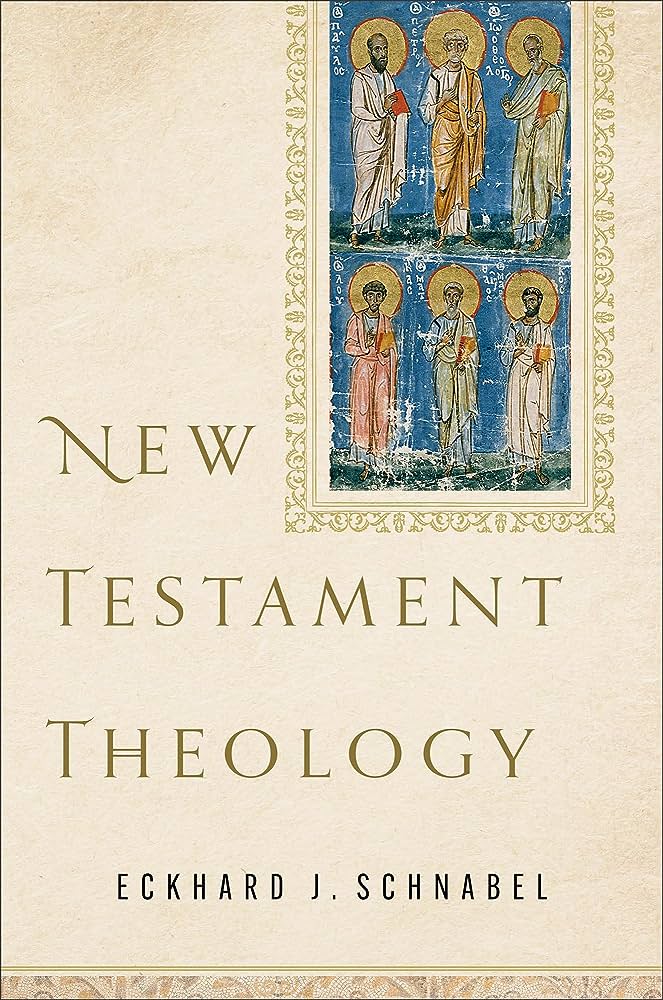A Conversation about New Testament Theology with Dr. Schnabel and Dr. McDonough
 Dr. Eckhard J. Schnabel, Mary French Rockefeller distinguished professor of New Testament, has recently published his New Testament Theology (Baker Academic, 2023). In a sit-down conversation with Gordon-Conwell’s Professor of New Testament, Dr. Sean McDonough, Dr. Schnabel explains how his offering stands out from many other New Testament theologies that have been previously published and introduces (among other things) how Paul’s theology of grace and James’s theology of works are not so far apart. Watch the full interview below.
Dr. Eckhard J. Schnabel, Mary French Rockefeller distinguished professor of New Testament, has recently published his New Testament Theology (Baker Academic, 2023). In a sit-down conversation with Gordon-Conwell’s Professor of New Testament, Dr. Sean McDonough, Dr. Schnabel explains how his offering stands out from many other New Testament theologies that have been previously published and introduces (among other things) how Paul’s theology of grace and James’s theology of works are not so far apart. Watch the full interview below.
McDonough: With all the New Testament theologies out there, what prompted you to want to write one of your own?
Schnabel: The main reason was twofold. Evangelicals in the U.S. and in Britain who wrote New Testament theologies used a different approach to content than I wanted to do. Howard Marshall’s New Testament Theology goes book by book, and Donald Guthrie’s massive New Testament Theology had a systematic approach. In terms of the classic systematic dogmatic themes, the standard German approach would be more historical. You begin with John the Baptist, then Jesus and the early Church in Jerusalem, then Paul, and then the rest of the New Testament. So I wanted to write a New Testament theology with a historical focus.
The advantage of doing a historical approach [is] that you deal with the diversity of New Testament documents. I began with the proclamation of Jesus and so focused not only on New Testament documents but on the proclamation of Jesus, which is the topic of Matthew, Mark, Luke, and John in the gospels. Then, even when it comes to the theology of Paul, there has been this long-standing discussion [about] what is the main theme of the center of Paul’s theology. All kinds of answers have been given. It appeared to me that though it might be somewhat simplistic—I think it’s true historically and theologically and from a literary standpoint, from a canonical standpoint—the theme of Paul’s theology, as is the theme of any New Testament theology, is Jesus: the life, the death, and the resurrection of Jesus.
McDonough: Let’s zero in on one particular point of tension in terms of unity and diversity. Paul says that we’re saved by grace through faith alone and then James says the example of Abraham sacrificing Isaac shows us that it’s not by faith alone [but by works]. That [has] caused all sorts of controversy over the years. How do you manage that particular tension between Paul and James?
Schnabel: If one reads Paul carefully it is pretty obvious that Paul exits the law and therefore “good works” when it comes to how we attain salvation. Salvation is by grace alone; God justifies sinners by his grace. But at the same time Paul expects followers of Jesus to live in a certain way. Pauline ethics begins if we take Romans not only in chapter 12 to 15, but [also] in the central section chapters 6, 7, and 8, [where] he talks about the consequences of conversion: that as a result of our commitment to Jesus, faith leads to obedience. His calling is to lead people, Gentiles, and Jews, to the obedience of faith. And so Paul is misunderstood if we understand him only in terms of freedom from the law [or] freedom from good works. There is also obedience to the will of God. We find that even in Martin Luther. Then when we come to James, yes, James rejects a superficial understanding of faith. But [he] actually makes very important statements about faith as well. James does not demand works without faith. He does demand good works, but he does so in the context of faith in Jesus.
 Dr. Eckhard J. Schnabel is Mary French Rockefeller distinguished professor of New Testament. In addition to his New Testament Theology, he has written several books, including Jesus in Jerusalem: The Last Days (Eerdmans, 2018).
Dr. Eckhard J. Schnabel is Mary French Rockefeller distinguished professor of New Testament. In addition to his New Testament Theology, he has written several books, including Jesus in Jerusalem: The Last Days (Eerdmans, 2018).
 Dr. Sean McDonough, professor of New Testament, has likewise written many books, his most recent being The Preacher’s Greek Companion to Philippians: A Selective Commentary for Meditation and Sermon Preparation (Hendrickson Publishers, 2023).
Dr. Sean McDonough, professor of New Testament, has likewise written many books, his most recent being The Preacher’s Greek Companion to Philippians: A Selective Commentary for Meditation and Sermon Preparation (Hendrickson Publishers, 2023).